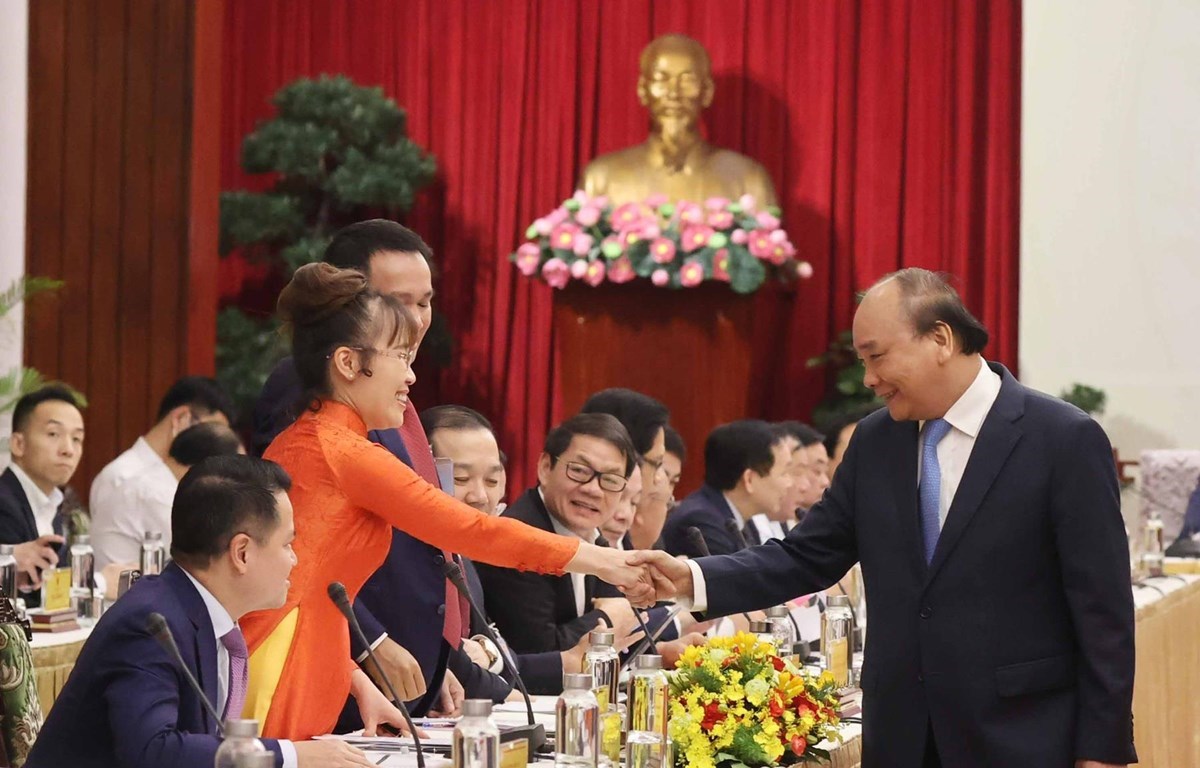Vietnamese entrepreneurs brace for challenges, difficulties caused by COVID-19
The Vietnamese business community has been contributing significantly to the economy as well as to social security, hunger eradication, and poverty reduction.

Vietnamese entrepreneurs have demonstrated the mettle of Vietnamese people in the international arena, contributing to the country's economic development. (Photo: VietnamPlus)
Hanoi (VNA) - Vietnam’s economy is going through a challenging period because of the COVID-19 pandemic. Many Vietnamese firms have been working hard to overcome related difficulties and promote the strength, spirit and bravery of Vietnam to push back the epidemic and join hands in economic recovery.
In this context, the business community celebrated the annual Vietnam Entrepreneurs' Day on October 13 in a more special atmosphere.
According to official statistics, Vietnam currently has about 850,000 enterprises, more than 25,000 cooperatives and about 5.6 million business households. The business community, in recent years, has grown continuously with the birth and development of leading private economic groups such as Vingroup, FPT, Vietjet, Sovico, Masan, Truong Hai, and Hoa Phat.
The prolonged pandemic has caused the production and business activities of many to stall. Therefore, many small- and medium-sized enterprises have had to suspend or close their operations. In this context, Vietnamese firms have strongly promoted their own spirit, will, creativity, and ability to cope with difficulties.
Thanks to timely support policies of the Party and State, many companies have removed difficulties in production, business activities, and circulation of goods. This allowed them to maintain their resources and ensure the lives of workers, even in the most stressful periods of social distancing.
In order to ensure the dual goals of both economic development and disease prevention, workers at essential businesses and production facilities have been given the priority to vaccinate and take part in a “three-on-site” working method.
Vietnamese entrepreneurs have even turned their risks into opportunities for post-pandemic recovery and breakthrough growth. They took the hardship as a chance to re-evaluate their governance capacity and ability to respond to market fluctuations, and to implement digital transformation and restructure resources towards a more sustainable direction.
Their efforts have so far produced specific outcomes. For example, in order to ease difficulties for the local stock market, two private economic groups, FPT and Sovico, actively proposed solutions to solve the situation of "congestion" on the system of the Ho Chi Minh Stock Exchange (HOSE) using their own financial, human and technological resources. FPT was set to implement technical solutions, while Sovico contributed financial resources.
After only three months, as committed to the Government and the Ministry of Finance, the system’s operation turned smooth and safe. It is now able to process 3-5 million orders a day, meeting the needs of the market at the same time and is no longer dependent on foreign technology.
The Vietnamese business community is also a key force in social security, hunger eradication, poverty reduction, and other community-oriented activities. In response to Prime Minister Pham Minh Chinh’s call to support the COVID-19 vaccine fund, businesses and entrepreneurs have contributed trillions of dong to speed up the vaccination campaign for the entire population. Since June, the fund has raised more than 8.6 trillion VND (337.9 million USD).
The business community also donated necessities, medical supplies, ambulances, and other things to aid people and localities in need./.
In this context, the business community celebrated the annual Vietnam Entrepreneurs' Day on October 13 in a more special atmosphere.
According to official statistics, Vietnam currently has about 850,000 enterprises, more than 25,000 cooperatives and about 5.6 million business households. The business community, in recent years, has grown continuously with the birth and development of leading private economic groups such as Vingroup, FPT, Vietjet, Sovico, Masan, Truong Hai, and Hoa Phat.
The prolonged pandemic has caused the production and business activities of many to stall. Therefore, many small- and medium-sized enterprises have had to suspend or close their operations. In this context, Vietnamese firms have strongly promoted their own spirit, will, creativity, and ability to cope with difficulties.
Thanks to timely support policies of the Party and State, many companies have removed difficulties in production, business activities, and circulation of goods. This allowed them to maintain their resources and ensure the lives of workers, even in the most stressful periods of social distancing.
In order to ensure the dual goals of both economic development and disease prevention, workers at essential businesses and production facilities have been given the priority to vaccinate and take part in a “three-on-site” working method.
Vietnamese entrepreneurs have even turned their risks into opportunities for post-pandemic recovery and breakthrough growth. They took the hardship as a chance to re-evaluate their governance capacity and ability to respond to market fluctuations, and to implement digital transformation and restructure resources towards a more sustainable direction.
Their efforts have so far produced specific outcomes. For example, in order to ease difficulties for the local stock market, two private economic groups, FPT and Sovico, actively proposed solutions to solve the situation of "congestion" on the system of the Ho Chi Minh Stock Exchange (HOSE) using their own financial, human and technological resources. FPT was set to implement technical solutions, while Sovico contributed financial resources.
After only three months, as committed to the Government and the Ministry of Finance, the system’s operation turned smooth and safe. It is now able to process 3-5 million orders a day, meeting the needs of the market at the same time and is no longer dependent on foreign technology.
The Vietnamese business community is also a key force in social security, hunger eradication, poverty reduction, and other community-oriented activities. In response to Prime Minister Pham Minh Chinh’s call to support the COVID-19 vaccine fund, businesses and entrepreneurs have contributed trillions of dong to speed up the vaccination campaign for the entire population. Since June, the fund has raised more than 8.6 trillion VND (337.9 million USD).
The business community also donated necessities, medical supplies, ambulances, and other things to aid people and localities in need./.
| On September 9, the Government issued a resolution on supporting enterprises, cooperatives and household businesses affected by the COVID-19 pandemic, with four groups of solutions. Accordingly, the resolution calls for drastic measures to fight the pandemic and at the same time create favourable conditions for enterprises, cooperatives and business households. These will help to recover, maintain and develop production and business. Secondly, the resolution requires ensuring stable production with smooth, efficient and safe circulation of goods, and overcoming supply chain disruptions. In particular, the Ministry of Transport will guide localities to uniformly implement the "green channel" of road and waterway transport nationwide. This will allow for the inter-provincial and inter-regional transport of goods to go smoothly, quickly and conveniently. No additional conditions or permits are required to ensure circulation of goods, especially essential goods, both for daily life and production. Thirdly, the resolution asks to cut costs, as well as remove financial difficulties and cash flow for businesses, co-operatives and business households. The fourth solution is to create favourable conditions for labourers and experts. |













